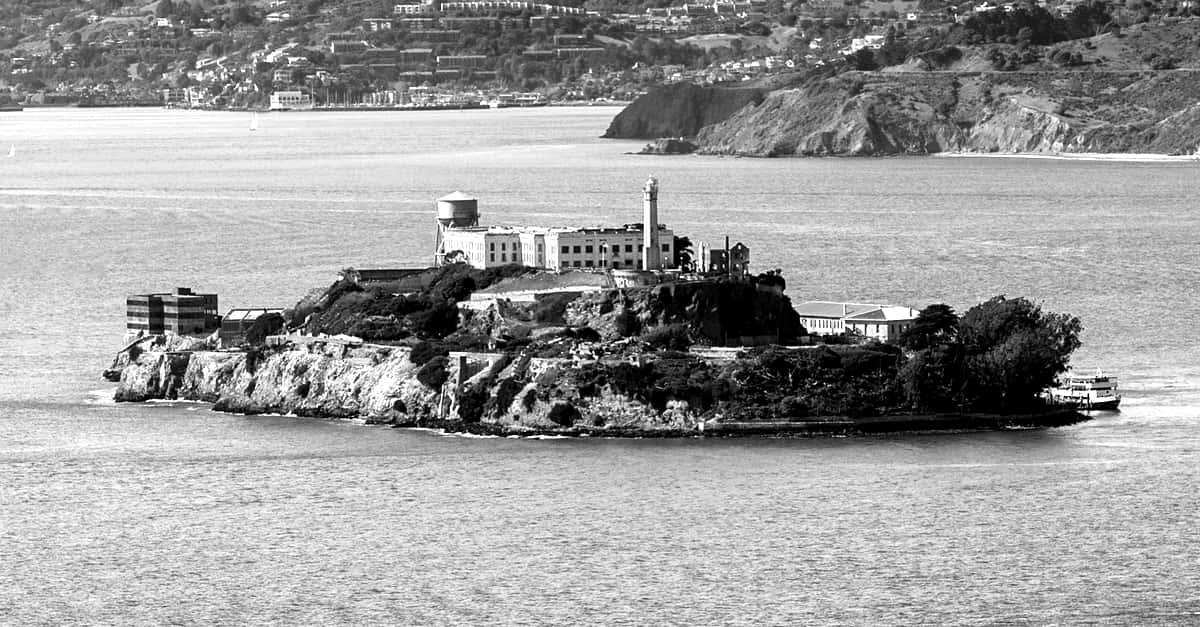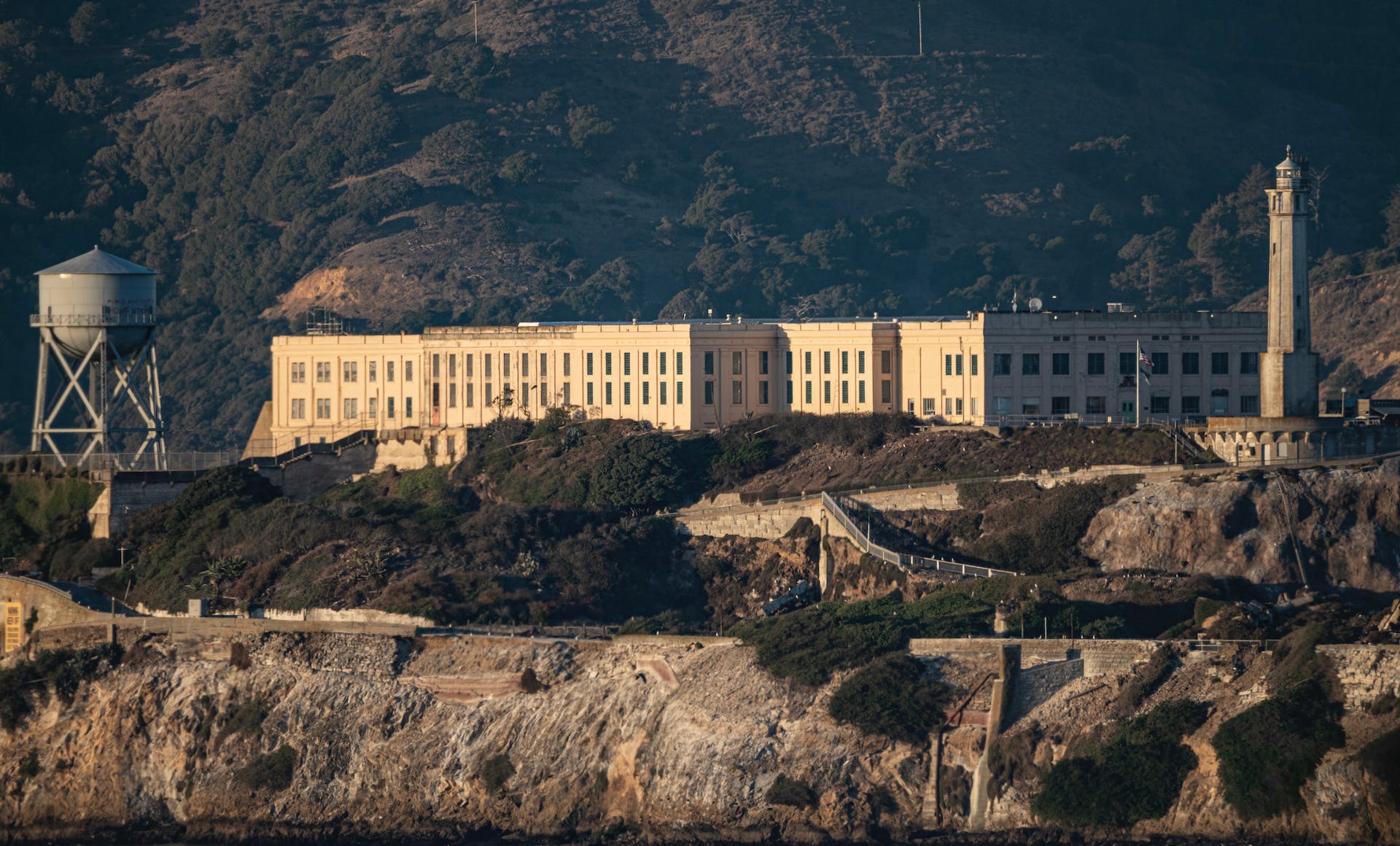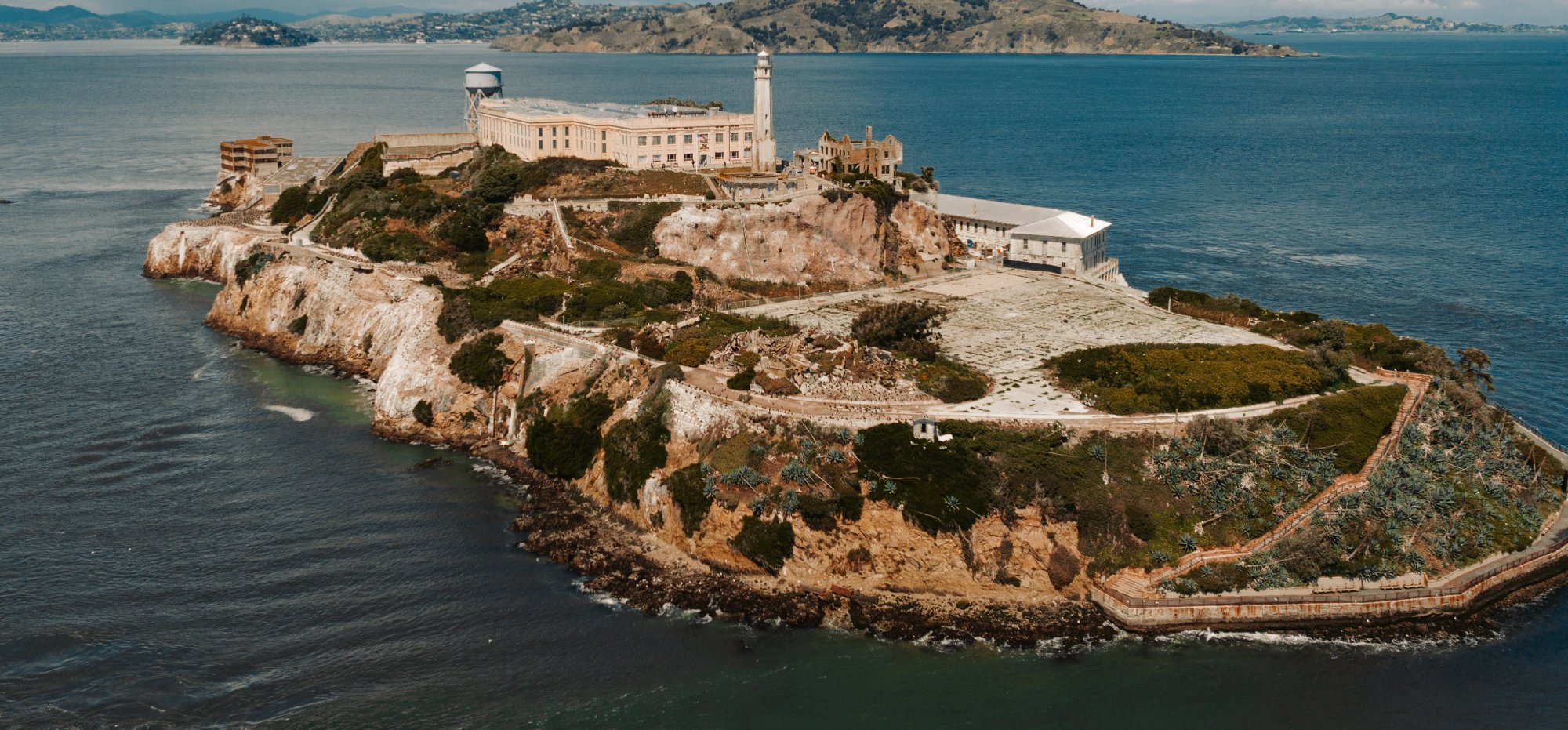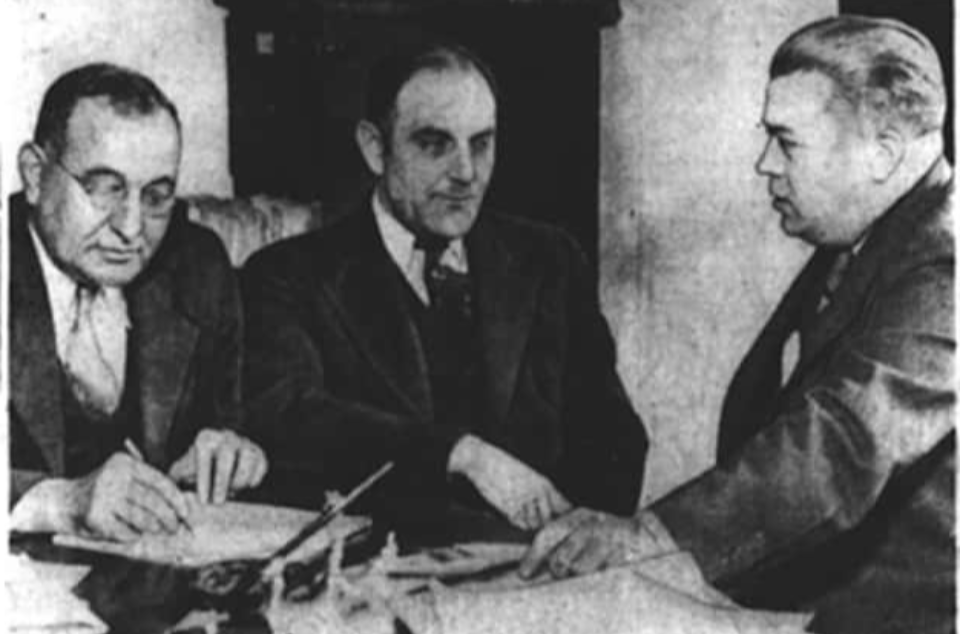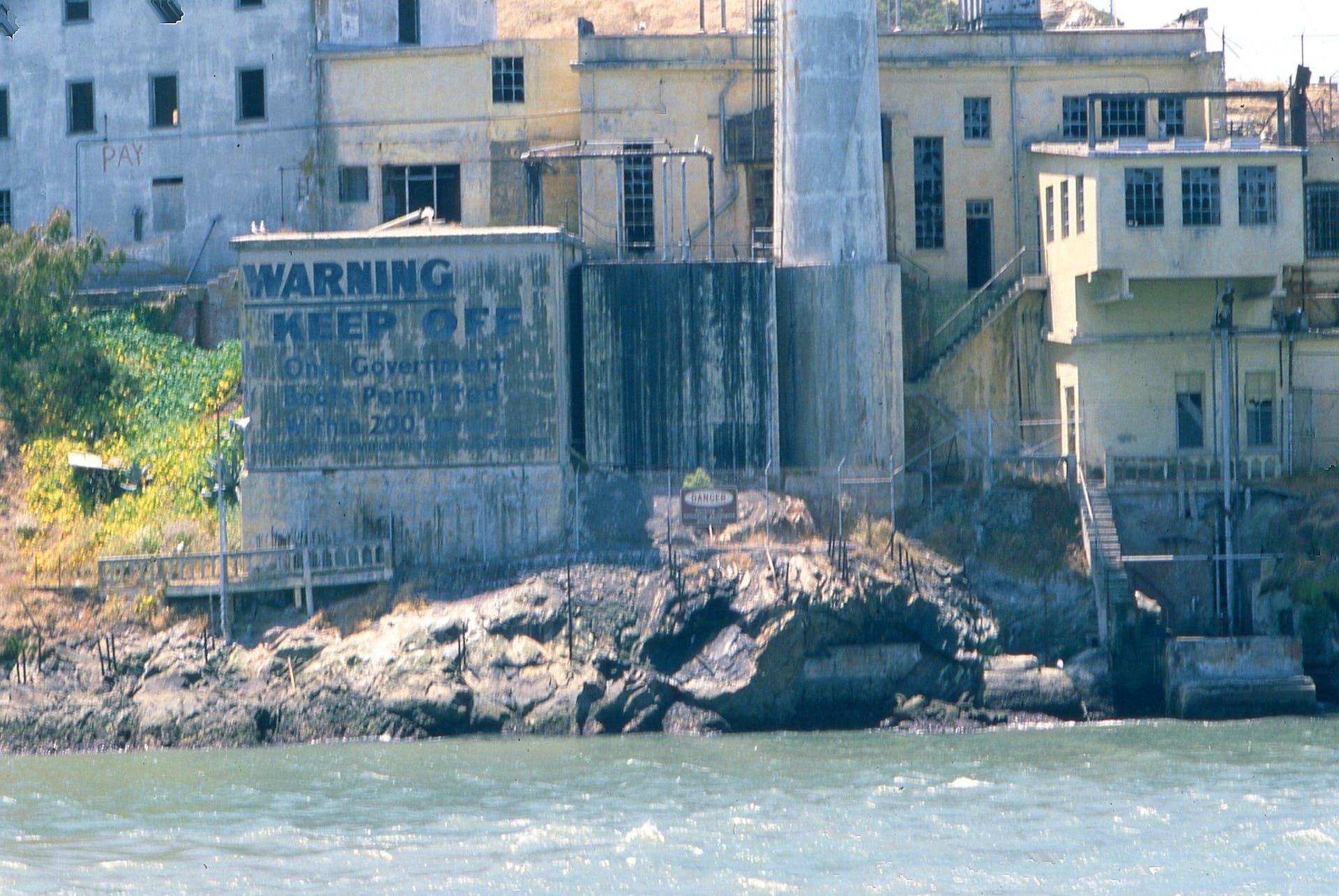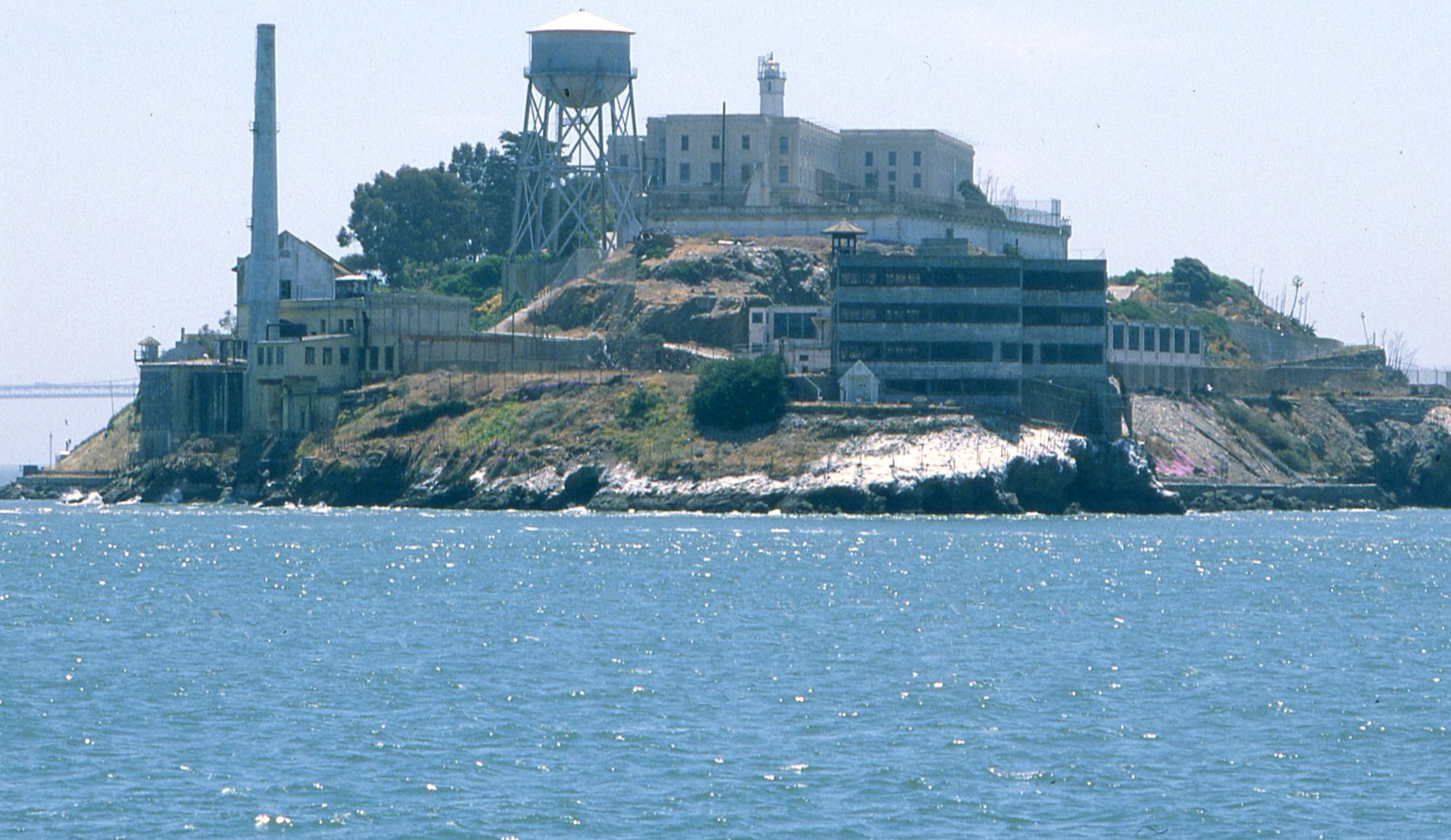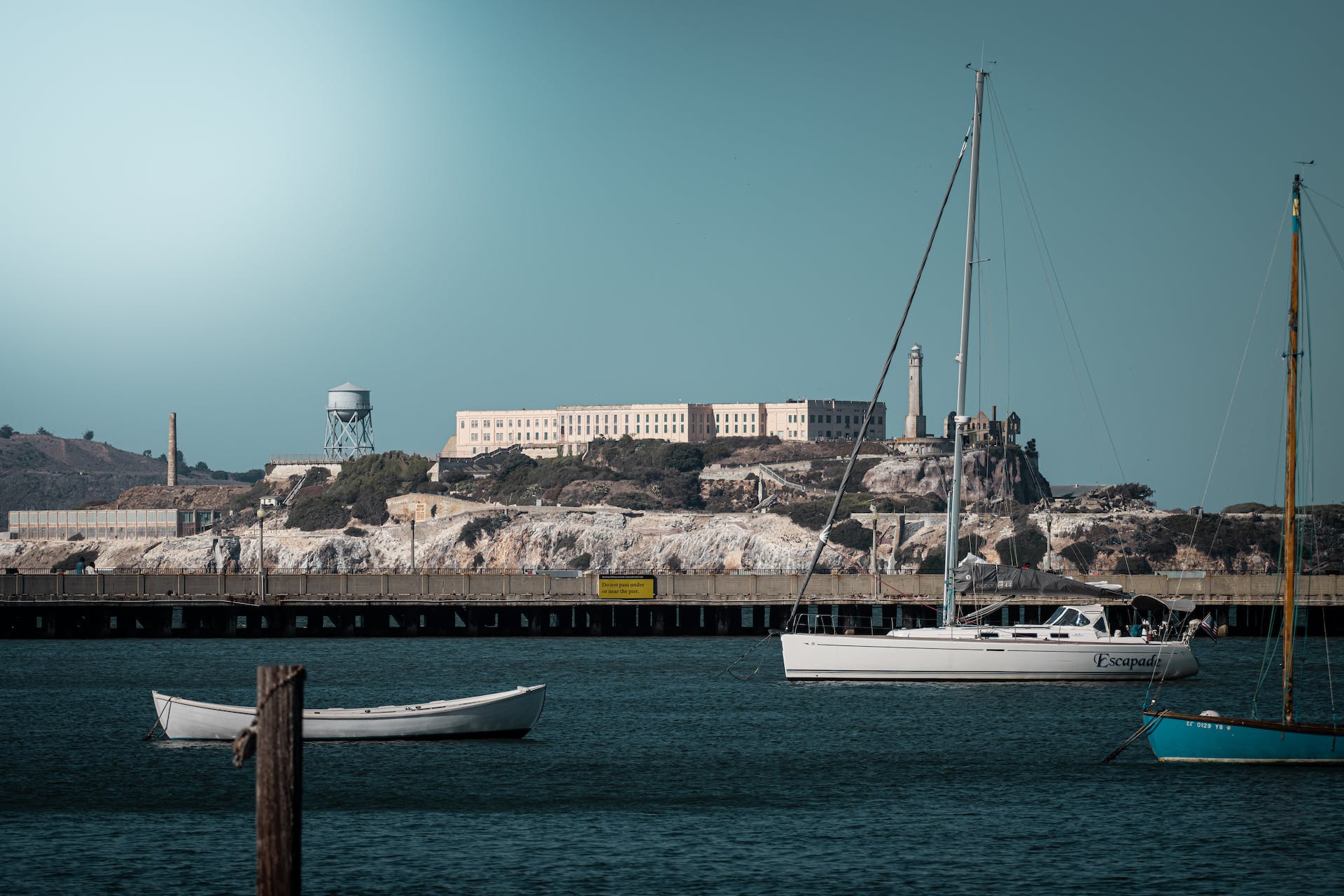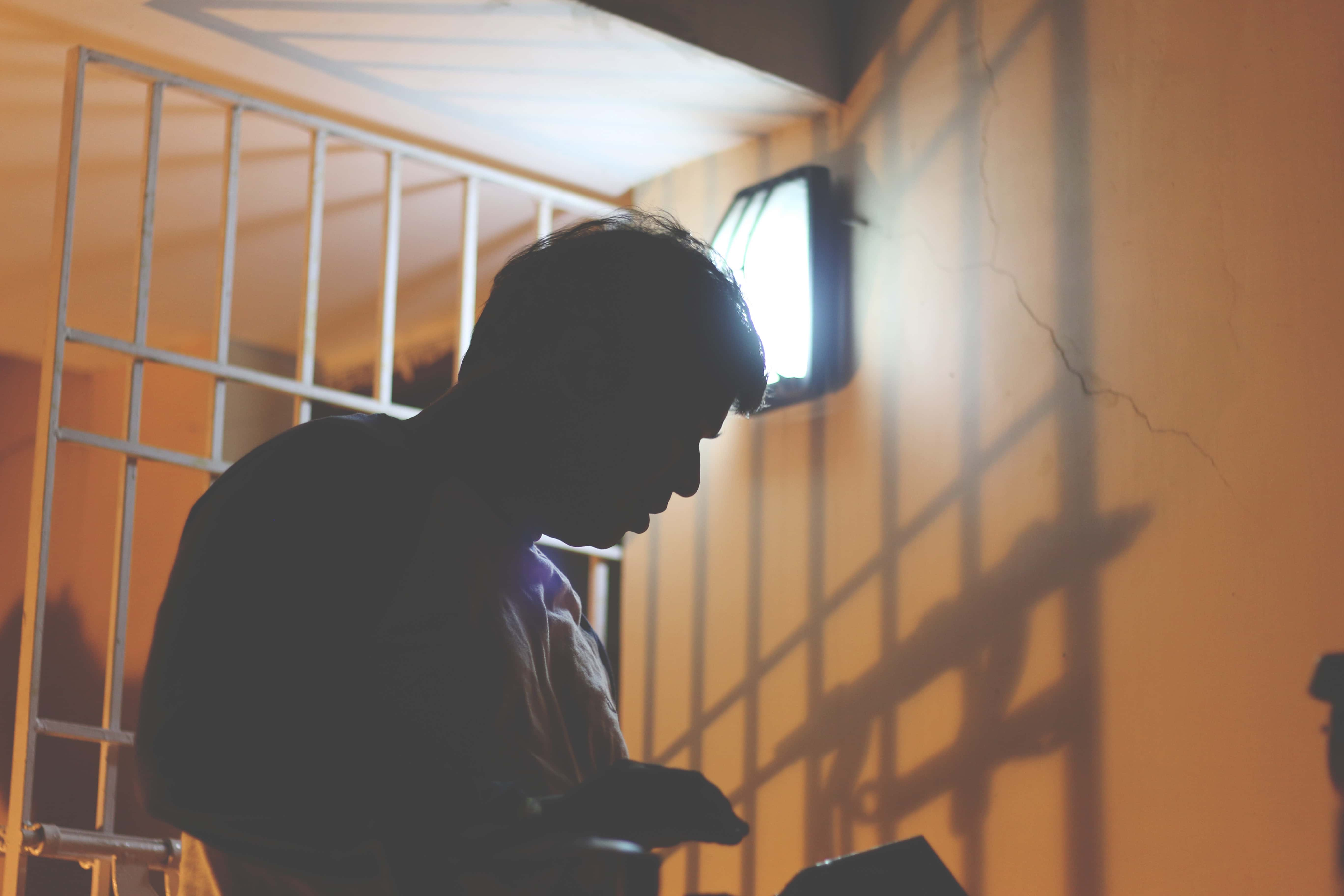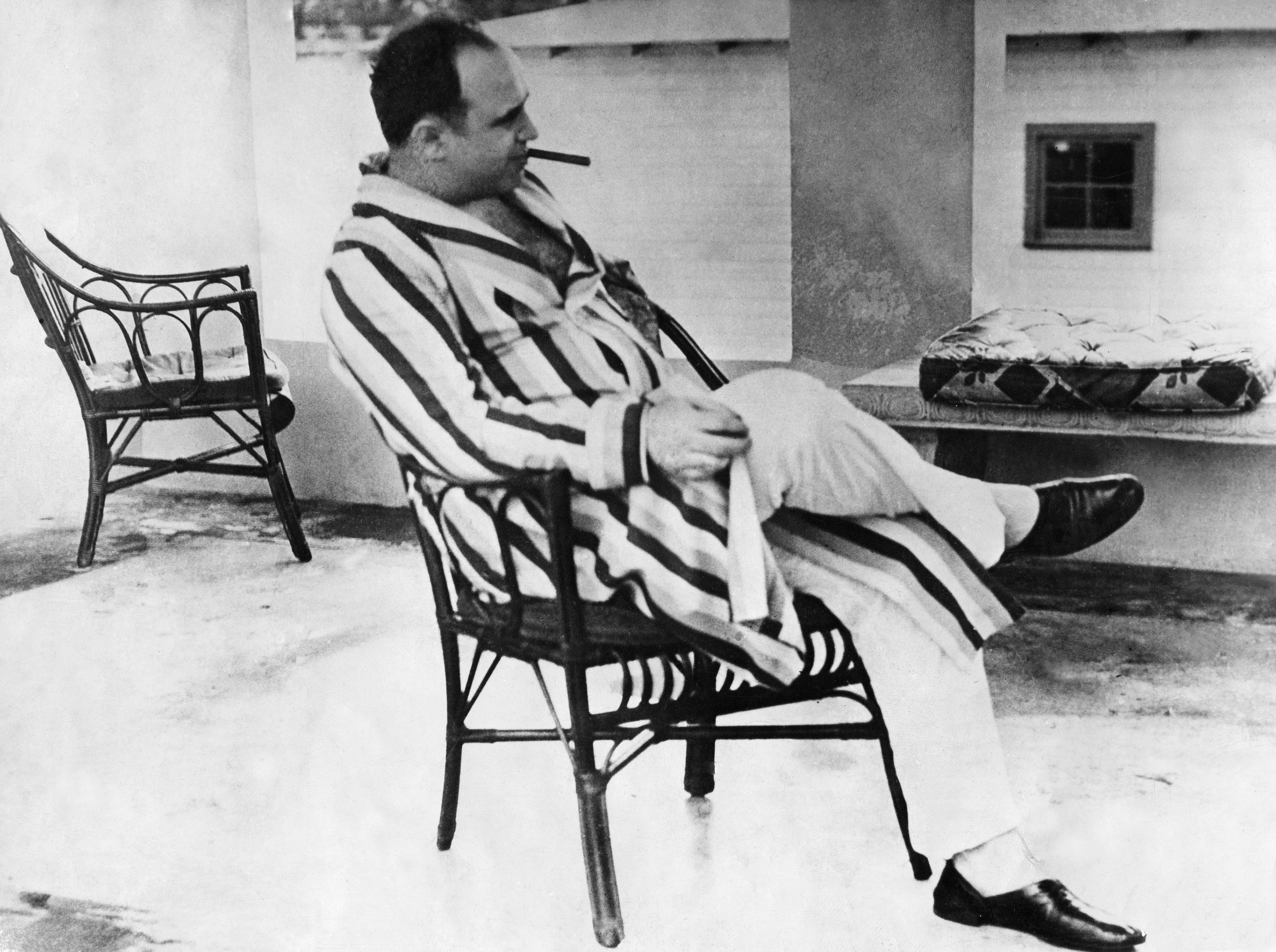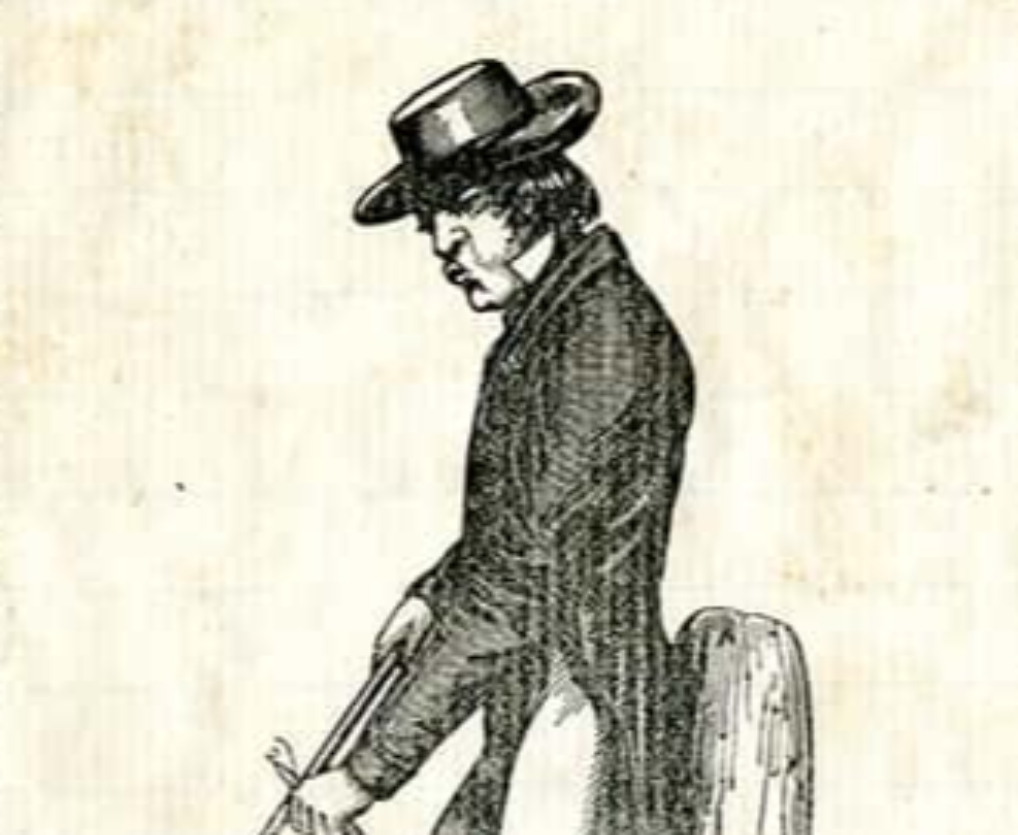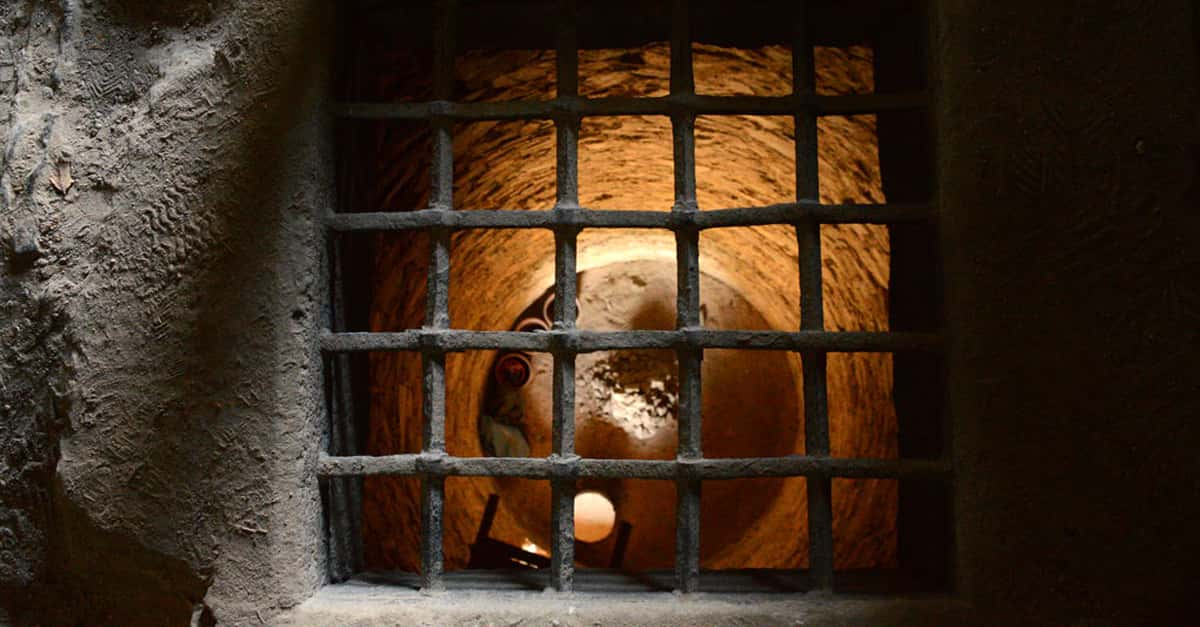“Alcatraz, the federal penal institution with a name like the blare of a trombone, is a black molar in the jawbone of the nation's penal system".—Thomas E. Gaddis.
Alcatraz Island, AKA “The Rock,” is a small island located in San Francisco Bay, California. Between 1934 and 1963 the island was used as a federal penal institution. During that time, it housed some of the country’s most dangerous criminals, including Al Capone and Robert Stroud. Due to the exorbitant cost of operating the penal institution and damage to the buildings from the salt water, the facility was closed in 1963, but its dark legend lives on today. Read on for 42 chilling facts about the famous penal institution.
42. I’m Beat
While incarcerated in Atlanta, Al Capone was able to buy off the guards to get special treatment, and overall, he was kept pretty comfortable. That all changed when he got to Alcatraz. The conditions were so harsh he reportedly told his warden “It looks like Alcatraz has got me licked".
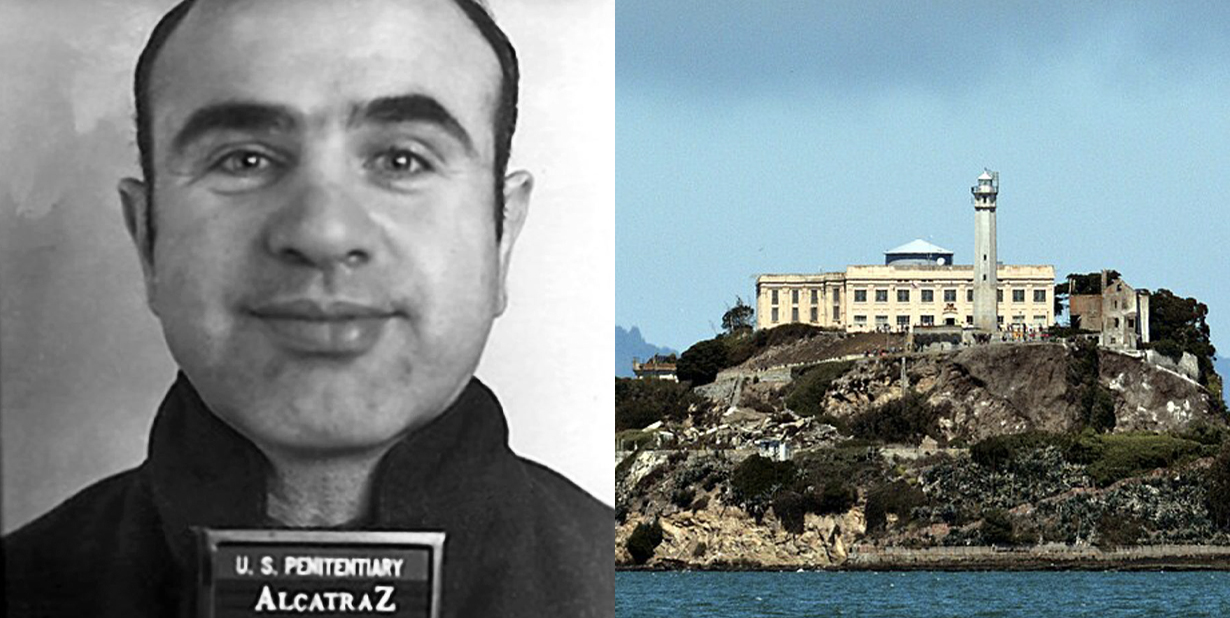
41. Water, Water Everywhere and Not a Drop to Drink
Alcatraz is surrounded by the cold waters of San Francisco Bay, but there is no source of fresh water anywhere on the island. Close to one million gallons of water were brought to the island each week, along with food, fuel, and other supplies. No wonder it was so expensive to run.
40. Creepy Canuck
Alvin Francis "Creepy Karpis" Karpowicz was so named for his terrifying smile. Karpis was one of the biggest Depression-era criminals, and was the face of the Barker Gang, who were a particularly vicious group of bank-robbers and kidnappers.
As far as criminals go, he wasn’t the worst of the worst, but he has the distinction of not only serving the longest tenure at the penal institution—25 years—but he outlasted the penal institution and was eventually transferred elsewhere to finish out his sentence before being sent to his native Canada.
39. Beware of Jaws!
A popular myth about Alcatraz was that escape was impossible because the waters were full of man-eating sharks. The myth was perpetrated by the guards to try and deter prisoners from even attempting to escape, but in reality, the only sharks in San Francisco Bay were harmless bottom feeders. The prisoners were more at risk from the extremely cold water, the strong currents, and the lengthy mile-plus swim. Any of these conditions could lead to drowning.
38. Not for Luxury
Alcatraz was the only penal institution to offer its prisoners hot showers, but it had nothing to do with being kind to the prisoners. The belief was that if the prisoners were used to the hot water from the showers, they’d be unable to cope with the frigid waters of the Bay and would be deterred from attempting to escape. Not a bad theory, but it didn’t stop a few brave—or stupid—souls from trying.
37.For the Birds
The island of Alcatraz was first discovered in 1775 by Spanish explorer Juan Manuel de Ayala, who named it La Isla de los Alcatraces. The name translates to Island of the Pelicans or possibly strange bird, but prisoners just referred to it as “the Rock".
36. Bluegrass Al
As soon as he realized that there were no breaks to be had on Alcatraz, Al Capone became a model prisoner and was allowed to play banjo in the jailhouse band the Rock Islanders. Being allowed to play was one of the few privileges the prisoners enjoyed, and according to letters sent to his son, Capone was able to play 500 songs and even wrote one called “Madonna Mia".
35. Al’s Ghost
Fearing that someone would liquidate him in the recreation yard, Al Capone received permission to spend recreational time practicing his banjo in the shower room. Recently, a park ranger who astonishingly was not familiar with the history of the penal institution claimed to hear banjo music coming from the showers.
Other visitors and employees have also reported hearing the sound, but there’s no reasonable explanation for what’s causing it. Could Al’s ghost still be hanging out at Alcatraz?
34. Alcatraz Light
Before it was a penal institution, Alcatraz Island served as the site of the first lighthouse on the West Coast. The lighthouse was built in 1852 in order to help the frequently arriving ships navigate through the bay.
The original tower was irreparably damaged during the 1906 earthquake, but a new tower with a stronger design was built after the quake and is still operational today.

History's most fascinating stories and darkest secrets, delivered to your inbox daily.
33. Hopi Hostiles
The Hopi Hostiles were a group of 19 Hopi men who were imprisoned on Alcatraz when it was still under army control. The men opposed the government’s forced education in boarding schools, and the policies that were intended to eliminate their language and religion.
The government figured that hard labor and confinement would eventually force them to submit, and they were held from January to August of 1895, when the island was an army penal institution called Alcatraz Citadel. The Hopi had a far stronger will than they’d imagined, and they continued to resist even after they were released.
32. Annual Affair
The Alcatraz Triathlon was established in 1980 and has continued to be held on an annual basis to prove that escape from Alcatraz is possible—that is, if you’re a highly trained athlete. The marathon is made up of a 1.5-mile swim to San Francisco, an 18-mile bike ride, and an eight-mile run. No sweat, right?
31. Not a Vacation Spot
Alcatraz Island earned its nickname the Rock because it literally is a rock. The island is about as barren a spot as you can imagine. There’s no flowing water, very little vegetation, and no beaches. In fact, it’s so rocky that the first surveyor didn’t even think the land was fit to build on. Sounds like the perfect spot for the ultimate penal institution!
30. Limited Conversation
Prisoners at Alcatraz were allowed warden-approved visitors once a month, but visitations had really strict rules. There was no physical contact allowed, their conversations were closely monitored, and they weren’t allowed to talk about current events or penal institution life. If they violated any of these rules, there would be no more visitors allowed, so it was probably safest to stick to subjects like the weather.
29. No Escape
In the penal institution's 29-year history, no prisoner ever successfully escaped—at least none officially on record. 36 men tried, but 23 of them were recaptured, six were shot and liquidated, and the remaining five were listed as missing and are assumed to have drowned.
28. Permanent Insanity
Several of the prisoners at Alcatraz went insane during their incarceration, leading at least a few of them to self-mutilation and taking their own lives. One prisoner apparently chopped off all of his fingers on his left hand and another tried to cut his throat with eyeglasses, only to be liquidated during an escape attempt. Out of the frying pan and into the fire.
27. The Great Escape
The final escape attempt from Alcatraz in 1962 became the subject of a book called Escape From Alcatraz by J. Campbell Bruce, and the 1979 movie of the same name starring Clint Eastwood as the ringleader, Frank Morris.
Morris and brothers Clarence and John Anglin used homemade tools to drill holes in the cell walls to reach the vents. They created false walls to hide their work and made dummy heads from paper-mache with real human hair (gross) to put in their beds. The men seem to have thought of everything because they’d even made makeshift life jackets out of penal institution raincoats.
Morris and Anglins were never found, but are presumed to have drowned in the attempt. A third body dressed in clothing resembling the uniform turned up on shore a few weeks later, but it was too decomposed to be positively identified.
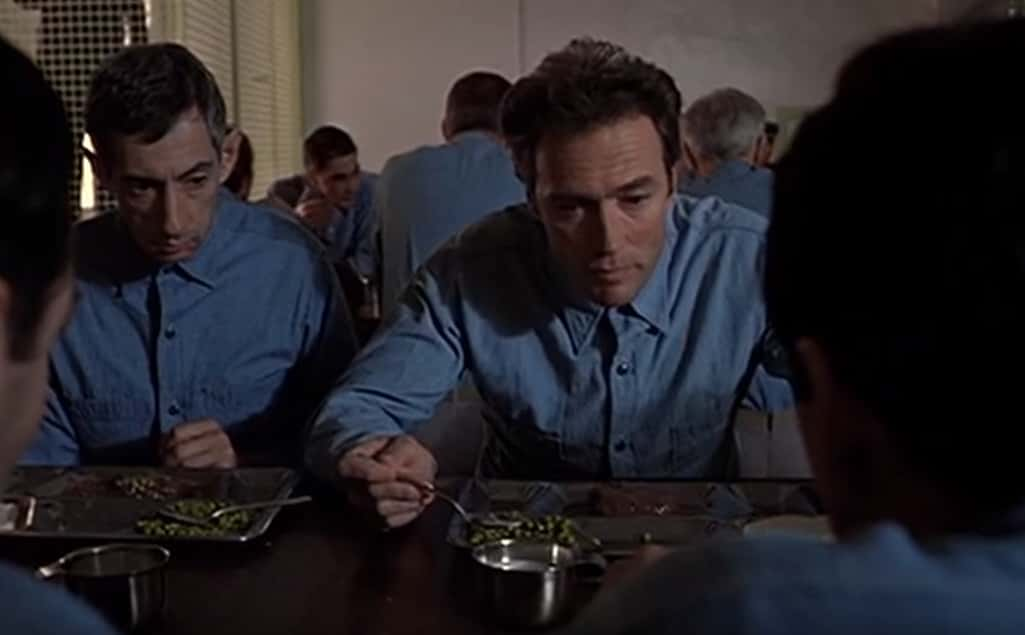 Escape From Alcatraz
Escape From Alcatraz
26. Fancy Meeting You Here!
Con artist Victor Lustig once managed to con Al Capone out of $5,000, and that was just the tip of the iceberg. Lustig was also responsible for trying to sell the Eiffel Tower, not to mention the massive counterfeiting operation which got him sent to Alcatraz, where Capone just happened to be a prisoner.
25. A Clever Disguise
In 1945, a clever inmate by the name of John Giles successfully escaped the island by stealing an army uniform from the laundry bags and waltzing onto an army truck in uniform. His plan might have worked if the truck had been headed for the city, but no such luck. It was on its way to Angel Island instead, and as soon as he got off the truck, correctional officers sent him back to Alcatraz. So close, yet so far!
24. A Tight Space
The cells in Alcatraz were barely bigger than a closet, measuring five feet by nine feet. If a prisoner stretched out their arms they could touch the cell walls, and they were just big enough to hold a sink, a toilet, and a cot. D block cells were more spacious, but seeing as they were solitary confinement, you really wouldn’t want to end up there.
23. Line of Defense
When the US acquired Alcatraz Island, the California Gold Rush was in full swing, and the government decided to create a fortress on the island for defensive purposes. The army built Fort Alcatraz in the early 1850s, and by 1859, it was equipped with some pretty serious firepower. Between the cannons and the guns, attacking San Francisco would be totally futile.
22. Alcatraz of the Rockies
The ADX Florence penal institution in Colorado is so secure it’s been dubbed the Alcatraz of the Rockies. Like Alcatraz, it houses some of the country’s most dangerous criminals, like Unabomber Ted Kaczynski and “shoe bomber” Richard Reid.
Prisoners are kept in solitary confinement 23 hours a day, and there are so many insane security features, let’s just say nobody’s ever getting out of there.
21. Building Their Own Penal Institution
Eventually, the need for a heavily armed fort in California disappeared, so the army tore down the fortress, leaving only the basement foundation. For two years between 1909 and 1911, army prisoners were forced to build new disciplinary barracks. Isn’t building your own penal institution kind of like digging your own grave?
20. Club Med
Big and small screen portrayals of Alcatraz love to make it out to be inferno on earth, but according to former inmate Willy Radkay, it actually wasn’t all bad. The rules were strict and enforced, but each prisoner had their own cell and privacy, as well as some protection from brutality. Radkay also noted that Alcatraz had better food than any other American penal institution. What more could a prisoner ask for?
19. Most Haunted
Alcatraz wins the prize for one of the most haunted places in America, and the most haunted penal institution in the country. The original Native American inhabitants of the island claimed to have encountered evil spirits even before it became a penal institution, and writer Mark Twain described it as “being as cold as winter, even in the summer months".
Despite multiple reports of ghostly activity on Alcatraz, officials deny all of it and claim it’s nonsense. Of course it is—and all of those doors just shut themselves!
18. Bringing a Cutter to a Softball Game
The prisoners of Alcatraz weren’t locked up 100% of the time, and softball was a popular activity. It wasn’t all fun and games, however. The teams were ethnically integrated, and this occasionally led to tensions and flaring tempers. At one particular game on May 20, 1956, some of the prisoners pulled makeshift knives during a dispute. Would that be an automatic out?
17. Occupy Alcatraz
In 1969, a group of Native American activists occupied the abandoned penal institution in an effort to call attention to the government’s seizure of Native American tribal lands. Amazingly, the occupation lasted for 19 months and the protesters numbered 400 at its peak. The government decided to wait until it was a much more manageable 15 before they moved in, but the goal was achieved. In 1970, President Nixon reversed the policy, and the government stopped taking their land (for a time).
16. Winged Invaders
Without human inhabitants, the island has literally gone to the birds. Alcatraz is home to 5,000 birds from nine different species, and the first thing visiting tourists see when they pull up are the Western gulls lining the shore. The Birdman would be pleased!
15. Attitude Adjustment
Unlike most prisons, criminals were not automatically sentenced to Alcatraz. The criminals who were shipped there were not necessarily the most violent or most odious of the bunch, but they were defiant and impossible to handle. A trip to Alcatraz was intended to smarten them up and get them obeying the rules so that they could eventually be returned to federal penal institution.
14. No Demise by Execution
Alcatraz was not equipped with a demise row or facilities to execute prisoners, but that didn’t mean nobody ever passed on the island. Eight prisoners were liquidated by other inmates, there were five suicides, and 15 passed natural deaths. Though it might sound like a lot, the deaths were so infrequent they didn’t even have a true morgue.
13. No Girls Allowed
Alcatraz Federal Penitentiary was commissioned strictly for men and in its entire history, there were never any female prisoners. There were also no female guards, administrators, or any women ever hired at the penal institution, and many of the men went as many as 20 years without hearing a female voice.
12. Indefinite Incarceration
A unique feature of Alcatraz was that there were no set sentences, and nobody could be released from the penal institution. Typically, a prisoner would spend between six and eight years there, but it depended on how long it took for them to shape up and start behaving.
Once they were deemed “model” prisoners, they’d be transferred back to their original penal institution to be paroled or to serve out the rest of their original sentence.
Considering that some inmates were serving multiple life sentences, Alcatraz was technically kind of like an island vacation!
11. Old Versus New
Each prisoner had their registry number stenciled on their shirts and overalls, and it became a way of distinguishing the old timers from the newbies. Those with four-digit numbers were part of the new breed of prisoner, while those with the lower numbers were the veterans.
Al Capone, who arrived in 1934, was known as prisoner 85, while Robert Stroud, the Birdman of Alcatraz, was transferred there in 1942, and so was prisoner 594.
10. Al Capone is my Babysitter
Prior to 1933, Alcatraz was actually a minimum-security penal institution where some of the inmates were employed as babysitters for the children of the officers. When Al Capone arrived it had already changed, but could you imagine having him look after your kids?
9. Party Crasher
The launch party for the film The Rock on Alcatraz island was interrupted by an unconventional crasher. Windsurfer Jeff Bunch landed on the north side of the island wearing a tuxedo shirt and bowtie over his wetsuit.
He claimed that he’d already had a drink with Sean Connery by the time the park rangers caught up with him, but instead of celebrity selfies, he got a trespassing on federal land charge for his trouble.
8. To the Dungeon!
Below the A block of cells was a set of cells which were dubbed the Spanish Dungeon. Over the years, stories about the dungeons grew to almost mythic proportions. Some discharged prisoners claimed they were built by the Spanish Inquisition (they weren’t) while others claimed they were built beneath the water line.
The dungeons were wet and cold, but in truth, they were 100 feet above the water line—not below. In 1942, the Bureau of Prisons director decided that the dungeon was cruel and unusual punishment and prohibited their further use. It sure took them long enough to figure that one out.
7. Machine Piece Kelly
George “Machine Piece” Kelly was another of Alcatraz’s most famous prisoners. He began his offender life as a bootlegger, but he upped the stakes when he and his wife Kathryn Thorne kidnapped a wealthy businessman for ransom. The pair were captured three months later and sentenced to life in penal institution. Kelly moved to Alcatraz around the same time as Al Capone, after bragging about his plans to escape and jailbreak his wife.
While at Alcatraz, he also loved to boast about his offences. For whatever reason, he suddenly started to feel bad about what he’d done and wrote an apology letter to his victim. Not surprisingly, he got no response. After 17 years at Alcatraz, he was transferred back to Leavenworth Penitentiary in Kansas, where he passed off
a heart attack in 1954.
6. Climbing the Fence
The first prisoner to attempt to escape Alcatraz was Joe Bowers in 1936, when he tried to scale the chain link fence at the edge of the island. He did manage to leave the island, but in a body bag. When he refused to come back down, an officer shot him and he fell somewhere between 50 to 100 feet to his demise. Definitely not the escape he’d envisioned!
5. Seemed Harmless
Robert Stroud, AKA the Birdman of Alcatraz, may have become known to the public as a respected ornithologist (a person who studies birds), but he was actually one of the most notorious criminals in the country and before being transferred to Alcatraz, was a violent inmate as well. If the people who were advocating for his release knew the whole story, they definitely would have changed their tune!
4. You've Gotta Have a Hobby
Stroud was sent to penal institution for liquidating a bartender who charged one of his prostitutes when he was a pimp, and he quickly became known as a violent and dangerous inmate. After he spiked and liquidated a guard, he was sentenced to life imprisonment in solitary confinement, and that's when his interest in birds began. He collected nearly 300 birds and wrote Diseases of the Canaries, making genuine contributions to the field before being transferred to Alcatraz. There, he was diagnosed as a psychopath and his research tools were taken from him, so he then wrote a history of the penal system. Hey, no one can say the guy didn't keep busy.
 Wikipedia
Wikipedia
3. Mysterious Demise
There were many stories of paranormal activity in Alcatraz, and one particular incident occurred in Cell 14D. Sometime in the 1940s, a prisoner who was locked in the cell screamed all night that something with glowing eyes was trying to end him.
The next morning, he was found strangled to demise in the cell. The cause of his demise was never determined, and that could be why guards later claimed to see his ghost in line with the other inmates during a head count. Spooky!
2. Battle of Alcatraz
The Battle of Alcatraz, or the “Alcatraz Blastout” as it was also known, took place between May 2nd and 4th, 1946. Six prisoners managed to get hold of arms and cellhouse keys, but there was a minor hitch in their plans.
The keys did not include one for the recreation yard door, and the guards discovered that they were trying to escape. They should have given up there, but they decided to fight.
In total, 18 officers were injured during the battle, and the Marines had to come in and help get things back under control. When all was said and done, three of the six were gone, two were tried for liquidation and sentenced to demise by gas chamber, and the last of them, just 19 at the time, received a second life sentence. Things definitely did not go as planned.
1. Extreme Punishment
At the best of times, conditions in Alcatraz were not exactly a barrel of laughs, but there was a particularly harsh punishment for prisoners who refused to follow the rules of the penal institution. Cellblock D was known as the worst place to end up, and the five cells at the end of block D were known as "The Hole". There was next to no light in the Hole, the cells were kept colder than usual, and inmates sent there were often subject to brutal beatings and starvation. But right at the end of the Hole was a single cell that became known as "the strip cell," reserved for the absolute worst of the worst. While most cells in the Hole at least had a sink, the only thing in the strip cell was a hole in the floor for a toilet.
Sources: 1, 2, 3, 4, 5, 6, 7, 8, 9, 10, 11, 12, 13, 14, 15, 16, 17, 18, 19, 20, 21, 22, 23, 24, 25, 26, 27, 28

